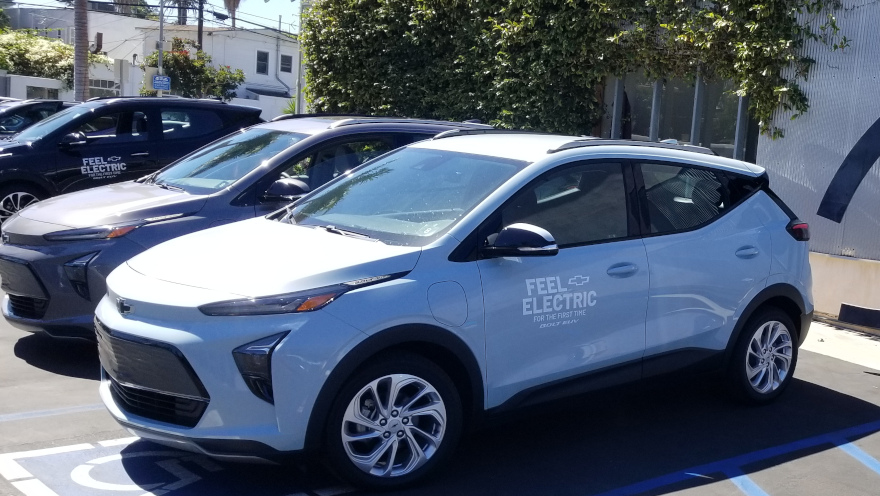Strong outlook for Chevy’s Bolt EV, both new & used

Chevrolet Bolt at a GM event in the Los Angeles area. Photo by Alysha Webb.
By subscribing, you agree to receive communications from Auto Remarketing and our partners in accordance with our Privacy Policy. We may share your information with select partners and sponsors who may contact you about their products and services. You may unsubscribe at any time.
LOS ANGELES –
Chevrolet showed up in the heart of electric vehicle country one Friday in September to show off its Bolt EV and Bolt EUV (electric utility vehicle).
The automaker aims to overcome a setback with its entry-level electric vehicle after it had to recall more than 140,000 because of a battery defect. Despite that glitch, General Motors is betting on a healthy demand for the EV. And indeed, the outlook for the Bolt — both new and used — may be pretty good.
“Chevrolet plans to produce more Bolts this year than any other year,” Shad Balch, director of Chevrolet Communications, tells Auto Remarketing at the event.
The ride and drive, held on Electric Avenue in Venice, Calif., was for walk-up potential EV owners and those who reserved spots in advance. More than 150 people participated overall, says Balch. Both models were available to test drive.
The Bolt recall started in November of 2020 with 2017 through 2019 model-year vehicles due to a battery fire risk with the LG batteries. GM believed a software fix could solve the problem, but after reports of battery fires in vehicles with the fix, GM eventually extended the recall to model years 2017 through 2022, encompassing more than 140,000 vehicles.
Earlier models are to receive a complete battery pack replacement while later models are getting the defective cells replaced. Chevrolet dealers had to stop selling Bolts in the summer of 2021. Sales resumed in April of 2022.
Subscribe to Auto Remarketing to stay informed and stay ahead.
By subscribing, you agree to receive communications from Auto Remarketing and our partners in accordance with our Privacy Policy. We may share your information with select partners and sponsors who may contact you about their products and services. You may unsubscribe at any time.
Chevrolet is targeting “anyone buying their first car” with the Bolt, says Balch. The 2023 model year has a starting MSRP of $25,600, around $6,000 less than the 2022 MY. California is fertile Bolt ground for several reasons.
The state accounts for more than 40% of zero-emission vehicle sales in the U.S., so the market is receptive to an economy EV. Gas in California is also more expensive than in most states — the average price for a gallon of unleaded gas the week of the Bolt event was around $5.50, according to AAA.
The state also puts money on the EV hood. While the implementation details of which vehicles will qualify for federal tax credits under the Inflation Reduction Act are not yet clear, the new Bolt definitely qualifies for California’s up to $7,000 tax rebate, as long as the program’s funding lasts, says Balch. “The value proposition is very compelling,” he says.
Perhaps surprisingly, the value proposition for a used Bolt is also pretty good. Recalls don’t have much impact on a vehicle’s residual value unless there is a “contentious nature” to the recall, Eric Lyman, VP of ALG at J.D. Power (J.D. Power acquired ALG in 2020), tells Auto Remarketing. If an automaker fights the reason for a recall, the news tends to “bubble up” on the front page of local newspapers, he says. “If an automaker is actively taking accountability there does not seem to be much impact on used-car values.”
According to ALG, a 2022 Chevrolet Bolt with an MSRP of $34,428 will retain 55% of its value after 24 months and a Chevrolet Bolt EUV with an MSRP of $37,129 will retain 57% of its value. The entire electric car segment retains 58% of its value and the electric SUV segment also retains 58% after 24 months.
Bolt owners who receive an entirely new battery should actually see a bump in residual value, says Lyman. “The biggest factor impacting the resale value of EVs is range,” he says. “If you are going to get a new battery, you are getting range as if it was a new vehicle. That is a positive thing.”
The electric vehicle segment as a whole is benefitting from ever-greater battery ranges in all models, adds Lyman. “We are seeing a massive increase in retained value for EVs with a 250-mile range versus the earlier range.” The 2023 Bolt EV has an advertised range of 259 miles.
Hertz should also be glad to hear the Bolt battery recall likely won’t put a huge dent in the model’s resale value, and that EV resale values in general are on the rise. The rental car giant and General Motors on Sept. 20 announced that Hertz will order up to 175,000 EVs from GM, including the Bolt. Fleet sales are important to GM because “they expose people to technology that is unique to them,” says Balch.
While that may sound like marketing-speak, its actually true for EVs. ALG doesn’t begin making a “negative adjustment” in a model’s resale value until rental fleet sales hit 25% of more of all sales, says Lyman. “Putting vehicles in a rental fleet could be a wonderful opportunity to educate people about EVs,” he says. “It really depends on the execution. We’ve seen fleet companies are interested in EVs because consumers are interested in them.”


